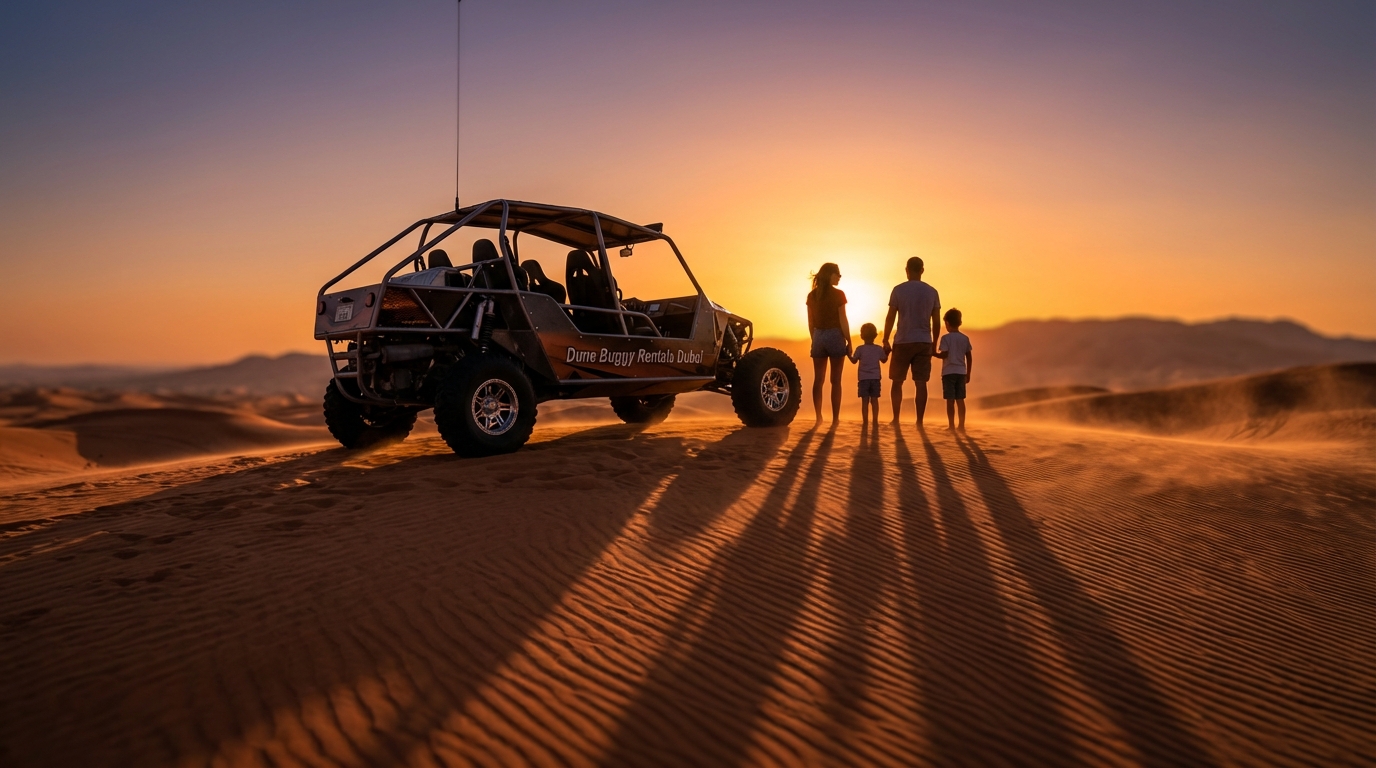Picture yourself in an endless sea of golden sand with the sun shining down fiercely. The heat in the Dubai desert can get up to 122°F (50°C) in the summer. If you’re thinking of exploring this unique place, knowing the temperature is key for your safety and fun. This dry area has a very hot climate due to low moisture and high evaporation. So, before you go on adventures like Dune Buggy Tours, make sure you’re ready. Understanding the extreme weather of the Dubai desert means you can have a thrilling and safe time.
Understanding the heat in the Dubai desert helps you know what to expect. This balance is crucial for a good time. Temperatures can rise above 104°F (40°C) during summer days, and it barely cools down at night. Staying hydrated and cool is important while you enjoy everything the desert has to offer. For tips on handling the heat, check out some affordable cooling hacks for your summer trips.
Key Takeaways
- The Dubai desert can reach remarkable temperatures, often exceeding 122°F (50°C).
- Summer months see temperatures soaring between 40-45°C (104-113°F).
- Humidity can approach 90% during the hottest months, making it feel even warmer.
- Daytime temperatures often do not drop significantly at night.
- Planning ahead for activities like Dune Buggy Tours is essential for a safe experience.
Understanding Dubai Desert Temperature
The Dubai desert has big temperature changes throughout the year. This affects those visiting or living there. Knowing about these changes helps you plan better activities, making sure you have a good time.
Average Temperatures Throughout the Year
In the Dubai desert, temperatures vary a lot over the year. The cooler months are between December and February, with averages around 75°F (24°C). However, during July and August, it gets really hot, about 107°F (42°C). These are the hottest months.
Day vs. Night Temperature Variations
Day and night temperatures in the Dubai desert are very different. Days can get extremely hot, but at night it might cool down to about 68°F (20°C). This change is due to its dry climate. When the sun goes down, the cooler air feels refreshing, making evening activities more pleasant. It’s important to check the weather before planning your day.
Extreme Weather Conditions
Sometimes, extreme weather like sandstorms can happen, making it hard to see and changing your plans. Knowing the weather forecast for the Dubai desert is key to planning safely. These unpredictable situations call for extra care, especially when booking desert safaris or dune buggy rides.
| Month | Average High (°F) | Average Low (°F) |
|---|---|---|
| January | 75 | 58 |
| February | 76 | 60 |
| March | 81 | 64 |
| April | 89 | 70 |
| May | 99 | 79 |
| June | 104 | 82 |
| July | 107 | 86 |
| August | 106 | 85 |
| September | 100 | 79 |
| October | 92 | 72 |
| November | 82 | 64 |
How hot is Dubai desert?
The Dubai desert can get very hot, affected by many factors. Understanding these can help you get ready for fun outdoors in this special place.
Factors Influencing the Heat
The desert’s location, little greenery, and city heat from fast growth increase temperatures. These make day activities under the sun more challenging without much shade.
Heat Index and Its Implications
In the Dubai desert, heat feels even hotter because of the humidity. Summer temps can hit 120°F, but it feels hotter. This can impact how comfortable and safe you feel doing things like sandboarding or enjoying a desert tour at night.
To have a good time, drink plenty of water and dress right. Check out this resource for tips on the best seasons for desert fun.
Conclusion
The Dubai desert is known for its extreme heat, especially in summer. You might wonder about the highest temperatures there. Knowing about the climate, like average temperatures and how they change from day to night, will make your visit better.
Yes, the desert can get really hot. But if you learn about the weather, you can get ready for fun stuff like desert safaris. It’s cooler in the early morning or late evening. A good idea is to check this guide on what to pack.
Get ready for some exciting times in the Dubai desert, from quad biking to barbecues. These adventures are memorable. But always remember, knowing about the desert climate helps you plan better and stay safe.
FAQ
How hot is the Dubai desert in summer?
In summer, the Dubai desert can get as hot as 122°F (50°C). This happens mainly in July and August. If you plan outdoor activities, prepare for this extreme heat.
What is the average temperature in the Dubai desert throughout the year?
The Dubai desert’s average temperature changes a lot during the year. During winter (December to February), it’s about 75°F (24°C). In summer, it can reach an average of 107°F (42°C).
Are there significant temperature differences between day and night in the Dubai desert?
Yes, the temperature in the desert changes a lot from day to night. During the day, it can get over 100°F (37.8°C). At night, it might cool down to around 68°F (20°C). This is a big difference.
What should I know about extreme weather conditions in the Dubai desert?
The Dubai desert can have extreme weather, like sandstorms. These storms can make it hard to see and travel. Always check the weather forecast before going on any trips.
What factors influence the heat in the Dubai desert?
The heat in the Dubai desert is affected by its location, very few plants, and heat from cities. These things make it hotter and more humid.
How does the heat index affect outdoor activities in the Dubai desert?
The heat index in the desert mixes humidity with temperature. It can make it feel even hotter. This means outdoor activities could lead to dehydration or heat exhaustion.
When is the hottest month to visit the Dubai desert?
July and August are the hottest months in the Dubai desert. Temperatures often go above 107°F (42°C). It’s vital to know this for a safe and fun visit.
How can I stay safe in the extreme heat of the Dubai desert?
To be safe in the desert’s extreme heat, drink lots of water, dress right, and do outdoor activities when it’s cooler, like in the early morning or evening.



